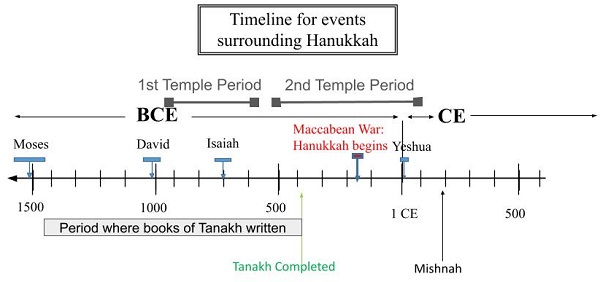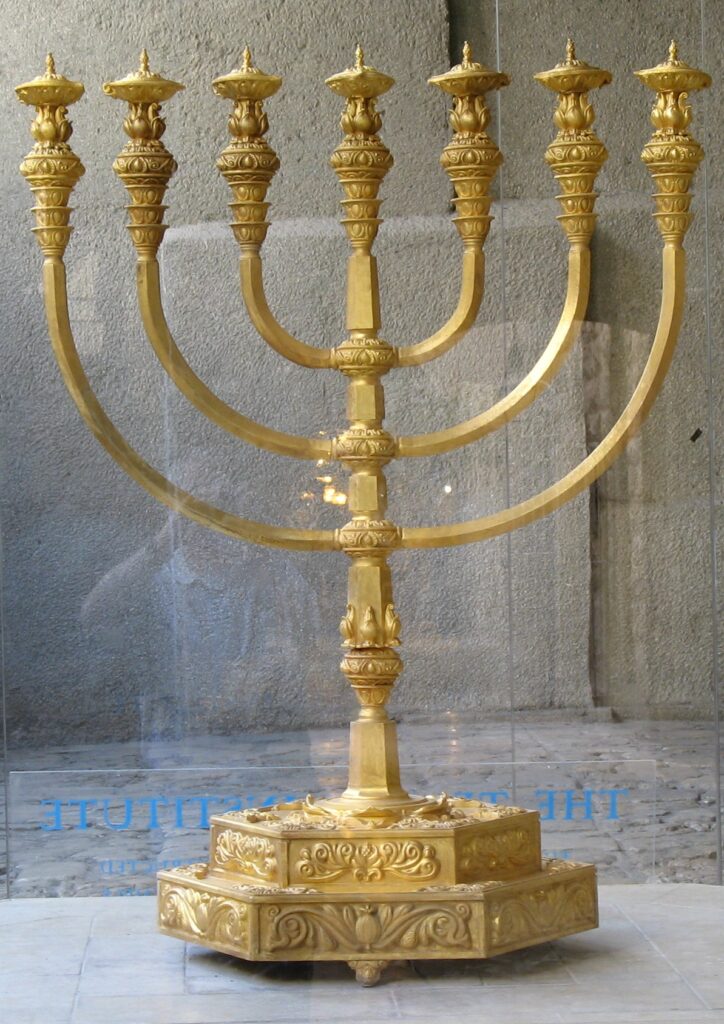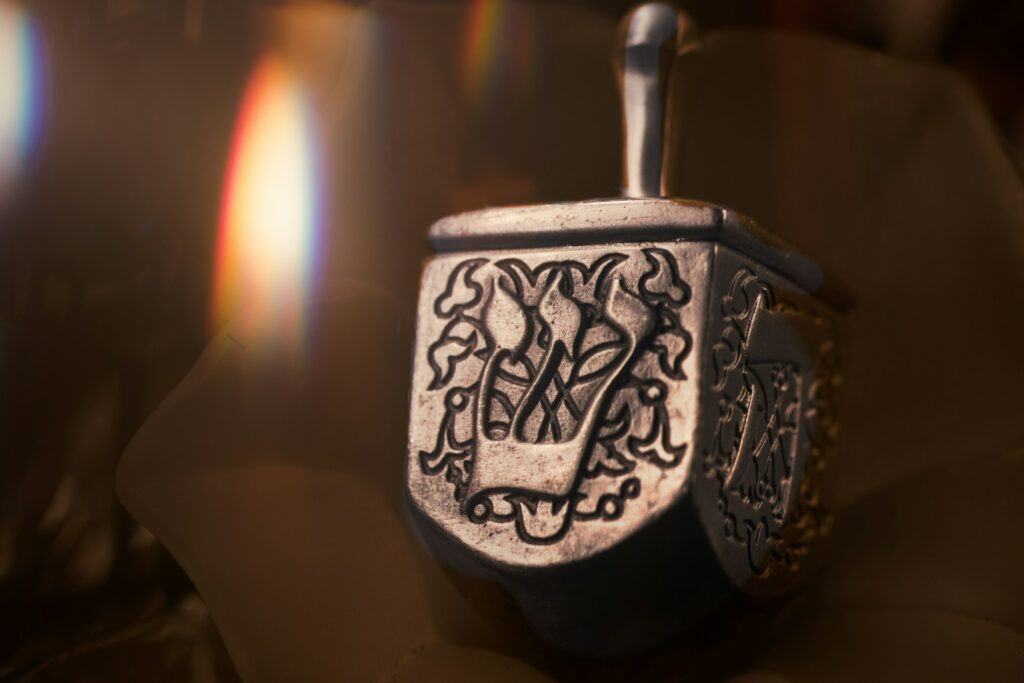Hanukkah is the latest of the traditional Jewish Festivals. It stems from the Maccabean Wars when Judah Maccabees liberated the Second Temple from the Greeks who had profaned it. The Maccabees discovered that they had only sufficient un-profaned oil to light the Temple menorah for one day. However, the oil miraculously proved sufficient to burn for 8 days, giving the Maccabees enough time to find more oil.
The Tanakh, completed ca 400 BCE, therefore does not mention Hanukkah anywhere in its text. The post Tanakh books of First & Second Maccabees records the historical events giving rise to Hanukkah. Josephus, writing just after the destruction of the Second Temple, mentions Hanukkah in passing. The Mishna (late 2nd century) mentions Hanukkah in several places. But it never describes its laws in detail and never mentions any aspect of the history behind it. The Talmud describes the miracle of the one-day supply of oil miraculously lasting eight days. But rabbis committed it to writing only about 600 years after the events described in Maccabees.

Thus, not much was recorded about Hanukkah. Rabbis and Historians wrote down their few existing records only hundreds of years after the Maccabean War (167 BCE). It may come as a surprise therefore to learn that a writing preserves a Jewish conversation which occurred on Hanukkah. It dates from the Second Temple Period. In fact, it occurred in the very Temple which was purified in that Hanukkah miracle.
It occurred between Yeshua and locals who wanted to probe the vexing question of his identity. The Brit Chadasha records it like this:
The Ancient Jewish Hanukkah Conversation
Then came Hanukkah in Yerushalayim. It was winter, 23 and Yeshua was walking around inside the Temple area, in Shlomo’s Colonnade. 24 So the Judeans surrounded him and said to him, “How much longer are you going to keep us in suspense? If you are the Messiah, tell us publicly!” 25 Yeshua answered them, “I have already told you, and you don’t trust me. The works I do in my Father’s name testify on my behalf, 26 but the reason you don’t trust is that you are not included among my sheep. 27 My sheep listen to my voice, I recognize them, they follow me, 28 and I give them eternal life. They will absolutely never be destroyed, and no one will snatch them from my hands. 29 My Father, who gave them to me, is greater than all; and no one can snatch them from the Father’s hands. 30 I and the Father are one.”
31 Once again the Judeans picked up rocks in order to stone him. 32 Yeshua answered them, “You have seen me do many good deeds that reflect the Father’s power; for which one of these deeds are you stoning me?” 33 The Judeans replied, “We are not stoning you for any good deed, but for blasphemy — because you, who are only a man, are making yourself out to be God.” 34 Yeshua answered them, “Isn’t it written in your Torah, ‘I have said, “You people are Elohim’ 1”? 35 If he called ‘elohim’ the people to whom the word of Elohim was addressed (and the Tanakh cannot be broken), 36 then are you telling the one whom the Father set apart as holy and sent into the world, ‘You are committing blasphemy,’ just because I said, ‘I am a son of Elohim’?
37 “If I am not doing deeds that reflect my Father’s power, don’t trust me. 38 But if I am, then, even if you don’t trust me, trust the deeds; so that you may understand once and for all that the Father is united with me, and I am united with the Father.” 39 One more time they tried to arrest him, but he slipped out of their hands.
40 He went off again beyond the Yarden, where Yochanan had been immersing at first, and stayed there. 41 Many people came to him and said, “Yochanan performed no miracles, but everything Yochanan said about this man was true.” 42 And many people there put their trust in him.
John 10:22-42
The Elusive Signature of Miracles…

Hanukkah obtained entry into the club of sacred festivals because of the miracle of the menorah burning for eight days. This was true even even though it occurred after the scribes and Cohen closed the canon of the Tanakh. After all, if that miracle of light really did happen it could only have done so by G-d’s intervention. The logic behind that seems straightforward. No human can stretch one day’s supply of oil into eight days. If the menorah continued to burn then it did so either because oil was supernaturally provided. Or it burned miraculously without any oil. Humans cannot manufacture either scenario, nor do we know of any plausible natural way this could happen. So most of us accept the reasoning that if the menorah really burned for eight days on one day’s oil supply then G-d enabled it through a miracle.
But the miracle of the oil is widely regarded as a legend and its authenticity has been questioned since the Middle Ages2. It is simply easier to believe that Maccabean authors embellished their tale rather than G-d actually intervening with a miracle. Which seems more likely? That G-d intervened or that victorious Maccabees ‘created’ the miracle in the story. Most of us would need to verify an event like this for ourselves to believe it. This shows the elusive nature of miracles. Even if the miracle did occur but we did not witness it then we are left trusting those recording it. Thus, for many Jews, since Hanukkah comes approximately at the same time as Christmas, it has simply become a Jewish tradition to celebrate in lieu of that global festivity.
Versus Yeshua’s Enduring Signature
In the conversation during Hanukkah recorded above Yeshua urged his compatriots to trust his deeds. The record indicates that some were persuaded by the miracles that they saw. They did place their trust in him. But we 2000 years later cannot verify any of the miracles that he supposedly did. So most find it easier, like with Hanukkah, to suppose that the account of his miracles are embellishments. And if that is so, then his claim to be one with G-d is also spurious.

But note that Yeshua in the conversation did not cite his miracles. Rather, he cited his ‘deeds’ to back up his claims. His hearers did take that as miracles and many were persuaded because they had seen them. His ‘deeds’ though are broader in scope than only miraculous events that only those present can verify or refute. ‘Deeds’ include all that he accomplished in fulfilling all the different manners of prophecies written down hundreds of years previously throughout the Tanakh. We can personally verify them by comparing the prediction (in Tanakh) with the fulfillment (in Brit Chadasha) and weighing the possible explanations.
Yeshua confidently based his entire credentials on the Tanakh. We see even in this conversation that he adopts a rabbinical legal reasoning stance when referencing Psalm 82:6. He did this expertly, as no other rabbi had done before. Nor has anyone since then so thoroughly based their credentials on the Tankah in diversity of ‘deeds’. We can evaluate and weigh them today as objectively as an eye-witness could have weighed any miracles he may have performed in their presence. In fact, he took this approach so that succeeding generations who could not see his miracles could weigh his deeds. I list some here:
Yeshua’s Deeds worth scrutinizing
- His ability, in his very name, to fulfill the Branch prophecy of Zechariah. He thus unites the First Temple role of King and Priest, the only person in history that even plausibly can.
- His ability, simply in his lineage from ancient King David, to fulfill the Branch prophecy of Isaiah. Jewish rabbis of that era confirmed his Davidic ancestry.
- His entry into Jerusalem on a donkey, fulfilling a prophecy of Zechariah, as well as Daniel’s prophecy of the ‘seventy-sevens’. We can calculate and verify the calendar for ourselves.
- His daily deeds during his last week mirror the deeds of Creation Week in the opening chapter of the Torah.
- The precise balance of events in his birth echo back to Isaiah’s virgin birth prophecy and Micah’s prophecy of Bethlehem.
- He was crucified on Passover. Rabbinic sources confirm this3.This showcases uncanny coordination with the first Passover of Exodus, unpacking meaning from the Passover details. No other Jew in all history has replicated this.
- He was also crucified on Mount Moriah, just outside the city walls of Jerusalem. This showcases remarkable coordination with Abraham in the binding of Isaac. It reveals meaning in that episode that is otherwise difficult to understand. No other Jew in all history has replicated anything close to this.
- His body disappeared post crucifixion. Alongside the courageous testimony of his disciples that they saw him alive from the dead this creates a unique case for a resurrection from death. No other person in all history has replicated anything like this.
- The timing of the day of his resurrection to the Torah ‘FirstFruits’ festival displays remarkable coordination over thousands of years.
- His authoritative teaching, changing the course of history on earth, fits the Torah promise of a coming prophet like Moses. No other Jew before or since – Maimonides, Josephus, Freud, Marx included – has had such an influence on the world through their teaching.
A Light Suitable for Hanukkah

Hanukkah celebrates the miraculous lighting of the menorah in the Second Temple. How appropriate therefore, to take opportunity to examine the credentials of the only Jew to claim (again in that temple):
Yeshua spoke to them again: “I am the light of the world; whoever follows me will never walk in darkness but will have the light which gives life.”
John 8:12
This fulfills the prophecy from Isaiah often read at Christmas (… so why not at Hanukkah?). It lays out the hope for peace yearned for by everyone, but particularly Israelis:
The people living in darkness
Isaiah 9:1
have seen a great light;
upon those living in the land that lies
in the shadow of death, light has dawned….
For a child is born to us,
Isaiah 9:5-6
a son is given to us;
dominion will rest on his shoulders,
and he will be given the name
Pele-Yo‘etz El Gibbor
Avi-‘Ad Sar-Shalom
[Wonder of a Counselor, Mighty God,
Father of Eternity, Prince of Peace],
6 (7) in order to extend the dominion
and perpetuate the peace
of the throne and kingdom of David,
to secure it and sustain it
through justice and righteousness
henceforth and forever.
The zeal of Adonai–Tzva’ot
will accomplish this.
- Psalm 82:6 ↩︎
- Fred Skolnik; Michael Berenbaum, eds. (2007). Encyclopaedia Judaica, Volume 8. Granite Hill Publishers. p. 332. ↩︎
- it was taught: On the eve of the Passover Yeshu was hanged. For forty days before the execution took place, a herald went forth and cried, ‘He is going forth to be stoned because he has practised sorcery and enticed Israel to apostasy. Any one who can say anything in his favour, let him come forward and plead on his behalf.’ But since nothing was brought forward in his favour he was hanged on the eve of the Passover! — Ulla retorted: ‘Do you suppose that he was one for whom a defence could be made? Was he not a Mesith [enticer], concerning whom Scripture says, Neither shalt thou spare, neither shalt thou conceal him? With Yeshu however it was different, for he was connected with the government [or royalty, i.e., influential].’ (Talmud, Sanhedrin 43a) ↩︎